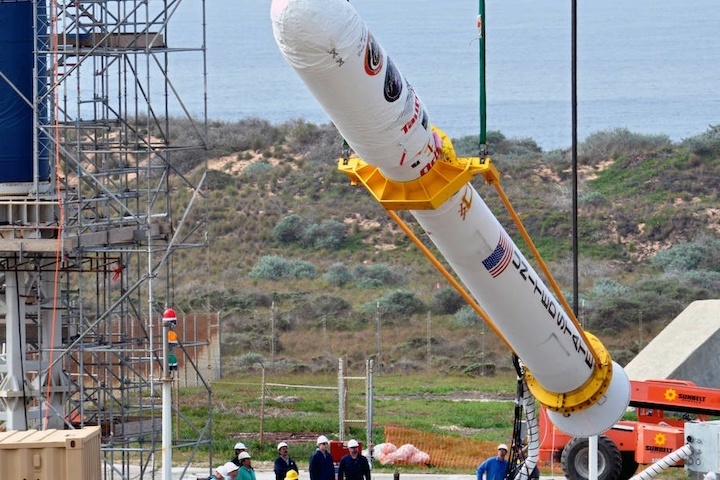6.05.2019
Faulty components supplied for Taurus XL rocket blamed for loss of Orbiting Carbon Observatory in 2009 and Glory mission in 2011

Orbital Sciences workers monitor NASA’s Glory upper stack as a crane lifts it into place atop the Taurus XL rocket on Space Launch Complex 576-E at Vandenberg Air Force Base in 2011. (NASA file photo)
Faulty aluminum components provided by a manufacturer that falsified tests doomed two Taurus XL rocket launches carrying a pair of NASA science missions into space from Vandenberg Air Force Base a decade ago.
Investigators have determined the root cause for the Taurus XL launch failures and pinned the blame on Oregon-based aluminum manufacturer, Sapa Profiles Inc. (SPI). The company now is known as Hydro Extrusion Portland Inc.
The flawed components led to failures for the space agency’s Orbiting Carbon Observatory and Glory missions, in 2009 and 2011.
NASA’s investigation into the mishaps led to federal criminal charges and an agreement for the company to pay $46 million to the U.S. government and other commercial customers, alleging a 19-year scheme that included falsifying thousands of certifications for aluminum extrusions to hundreds of customers.
“For nearly 20 years, Sapa Profiles and Sapa Extrusions falsified critical tests on the aluminum they sold — tests that their customers, including the U.S. government, depended on to ensure the reliability of the aluminum they purchased,” Assistant Attorney General Brian A. Benczkowski said.
“Corporate and personal greed perpetuated this fraud against the government and other private customers, and this resolution holds these companies accountable for the harm caused by their scheme.”
NASA previously had pinpointed the rocket’s payload fairing, or nosecone, as failing to separate as planned.
The clamshell structure protects the satellite as the rocket travels through the atmosphere.
The heavy weight sent the satellites plummeting into the ocean instead of continuing toward space.
Authorities had remained mum on the root cause until the conclusion of the criminal case last week.
Investigators claim SPI altered test results and provided false certifications to Orbital Sciences Corp., the manufacturer of the Taurus XL, regarding the payload fairing aluminum components considered key for ensuring the two halves properly separate.
Those tests were designed to ensure the consistency and reliability of aluminum components made by the company, federal officials said.
“NASA relies on the integrity of our industry throughout the supply chain,” said Jim Norman, director for launch services at NASA headquarters in Washington, D.C. “While we do perform our own testing, NASA is not able to retest every single component. That is why we require and pay for certain components to be tested and certified by the supplier.
“When testing results are altered and certifications are provided falsely, missions fail. In our case, the Taurus XLs that failed for the OCO and Glory missions resulted in the loss of more than $700 million, and years of people’s scientific work,” he continued. “It is critical that we are able to trust our industry to produce, test and certify materials in accordance with the standards we require.
“In this case, our trust was severely violated.”
Instead of scientists and engineers excited to start receiving data from the satellite missions, they showed up at post-launch news conferences devastated at the failures.
The second rocket also carried a Cal Poly student project holding three small satellites built by university students in Colorado, Kentucky and Montana, all of which also ended up in the ocean.
It wasn’t just NASA missions affected. Flawed components also were provided for missiles used by Missile Defense Agency systems, the U.S. Attorney’s Office said.
To protect the government supply chain, NASA both suspended SPI from government contracting and proposed SPI for debarment government-wide. The exclusion from government contracting has been effective since Sept. 30, 2015.
“Due in large part to the hard work and dedication of many highly motivated people in the NASA Launch Services program, we are able to close out the cause of two extremely disappointing launch vehicle failures and protect the government aerospace supply chain,” said Amanda Mitskevich from NASA’s Kennedy Space Center at Cape Canaveral, Fla.
The OCO mission was designed to study carbon dioxide in Earth’s atmosphere to help scientists learn the characteristics of climate change. Glory also has a role related to climate change.
The investigation also led to a criminal charges against an SPI testing lab supervisor who pleaded guilty in July 2017. He was sentenced to three years in prison and ordered to pay more than $170,000 in restitution.
Quelle: Noozhawk
